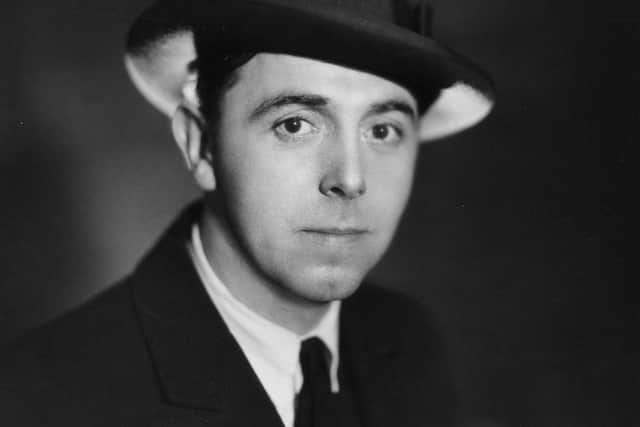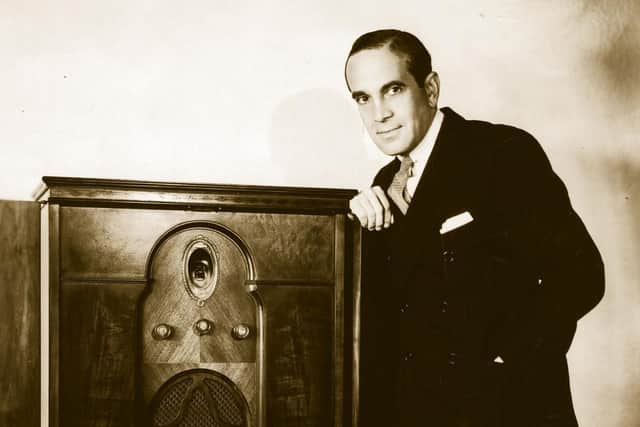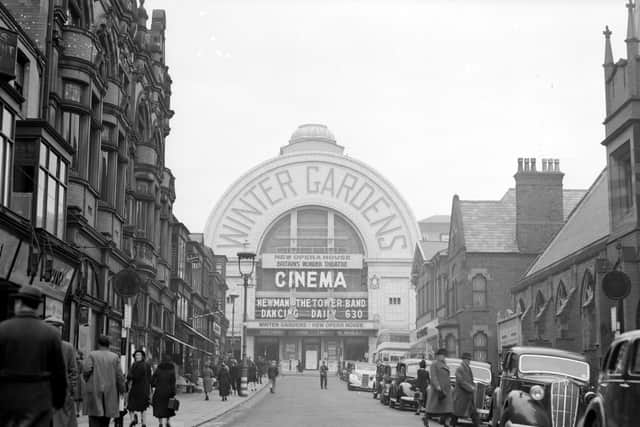How the first talkies brought riot of camera action to Blackpool
and live on Freeview channel 276
It is ninety years since the first talking picture to be filmed in Blackpool was actually shown here.
Talkies had come to the town a couple of years before, and while the first two of them starred Al Jolson, The Singing Fool was seen – and heard – at the Hippodrome long before The Jazz Singer at the Winter Gardens.
Advertisement
Hide AdAdvertisement
Hide AdThen, No Lady was the talk of the town. In the summer of 1930, the Promenade was suddenly a riot of cameras and lights, men with bullhorns, and crowds of excited onlookers.


The star, and also the director, of this film was the great Lupino Lane, who had been born Hackney and claimed to come from ‘the Royal Family of Greasepaint’. What he had come from most recently was a decade in Hollywood, where he had made films with the likes of Roscoe ‘Fatty’ Arbuckle and DW Griffith.
Now, Lupino played a man who goes on holiday with his wife and children, only to be mistaken for a foreign spy who is determined to stop the British champion winning a prestigious flying competition.
And while there would certainly be talking in this film, there would also be music – much of it the work of Herman Darewski, who was well-known at the seaside.
Advertisement
Hide AdAdvertisement
Hide AdA popular dance band leader, Mr Darewski was also a prolific composer. (The Great War hit Sister Susie’s Sewing Shirts for Soldiers had been one of his.) He spoke five languages and always wore a carnation in his button hole, and he too appears in No Lady, albeit as conductor of something called the ‘Blackpool Tower Band’. In real life, Herman had spent the summer playing at the Empress Ballroom in the Winter Gardens.


Before that, he had spent a good few seasons in Bridlington, where his salary (in today’s money) was £11,000 a week. He had recently written the music for another Lupino Lane film, and when he arrived here he found himself caught up in a debate that had been raging for several days. ‘I have never found that Blackpool girls are gold-diggers,’ he told a reporter.
The ‘interior’ shots for No Lady had already been filmed, on elaborate sets put up in studios at Shepherd’s Bush. And the man who designed those sets had his own local connection.
Andrew Mazzei had lived in Blackpool for a while, and even been married here, and most recently he had designed the Olympia Hall, which had been built inside the Winter Gardens complex, in the place where the Big Wheel had once stood. In his mid-forties by now, he was the veteran of many films since making his debut with an early version of Hindle Wakes.
Advertisement
Hide AdAdvertisement
Hide AdThe weather in Blackpool that August was distinctly changeable, with daytime temperatures in the mid-eighties, but filming frequently brought to a halt by thunderstorms. There were as many people bathing between the piers as promenading, with thousands more basking in deckchairs. And a barker at the entrance to North Pier could be heard to shout, ‘Come and see Mr Lane make a Talkie!’


In Talbot Square, the onlookers had to be held back by a rope, and by the combined efforts of local policemen and Boy Scouts. Mr Darewski and his band serenaded them with a medley of popular tunes. And the Mayor, perhaps hoping to catch the director’s attention, had turned up in the full civic regalia.
Lupino Lane’s last few American were doing the rounds at this time – The Love Parade, in which he appeared alongside Maurice Chevalier, the most prominent – and in the evenings, local cinemas showed several of them back-to-back. Then, at the end of the week, there was a glittering ball at the Winter Gardens, attended by the star and other members of the cast, with drinking past eleven o’clock and dancing until two.
It was in London the following May that No Lady was shown to the film trade, just as Andrew Mazzei’s latest creations – including the Baronial Hall, the Spanish Hall, and the Galleon Bar – were opening for business at the Winter Gardens.
Advertisement
Hide AdAdvertisement
Hide AdThe trade paper The Bioscope was impressed, calling the film ‘splendid entertainment for patrons of every age, class and nationality.’ Kinematograph Weekly, meanwhile, called it ‘excellent light entertainment,’ which, ‘moves at a merry pace and works up to a capital climax.’
In Blackpool, the grand opening night was Sunday, 12th July 1931, with the film being shown at the Winter Gardens not only in the afternoon, and twice in the evening, but at 10.30 in the morning as well. ‘A screaming farce of Blackpool holiday life!’ the advertisements proclaimed. ‘See yourself on the screen in this, the greatest British Talkie yet produced.’
Over seventy breathless minutes, and whether or not they caught sight of themselves, audiences would see Lupino get chased by the police, run into a ladies’ baths, come out dressed as a woman, get chased by bathing beauties, descend from the top of the Metropole Hotel using his umbrella as a parachute, get chased by his own wife, walk off Central Pier in a striped blazer, dangle from one of the flying boats on the Pleasure Beach, run in and out of cars and trams, make his get-away along the beach, ride a tricycle through a Punch & Judy show, fly a glider, crash the glider onto the beach, and be left spinning on his head like a child’s top.
And this created excitement in other towns as well. ‘No need to go to Blackpool,’ one cheeky cinema-owner announced, ‘We bring it to Burnley,’ and a local newspaper said of the film, ‘If you like your humour broad and unsubtle you will thoroughly enjoy it.’ Up the road in Nelson it was described as ‘a thrill-a-minute, laugh-a-second type of entertainment’, while even in far-away Newquay they were hailing it ‘a hilarious affair, which completely captivates the holiday spirit.’ Whatever its merits, No Lady would be re-released in 1943, long after its star had stopped making films, at a time when the people of Britain needed to be cheered up all over again.